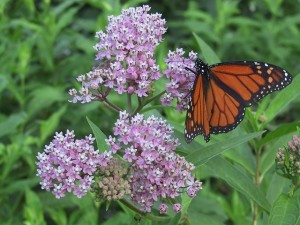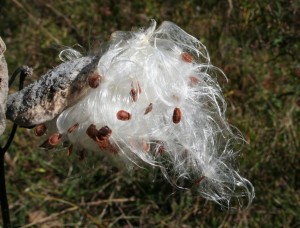Let’s Talk About Milkweed
It’s time to start thinking seriously about plants again. If you’re not in planting mode, you need to get there. It will come and go faster than you realize. This year, plant for the wildlife in and around your garden to encourage its return and survival. Here’s an idea…let’s talk about milkweed.
It’s a hot topic right now and for good reason: monarch numbers are dwindling. Whether it’s related to weather, pesticides, or a combination of both, it’s clear that gardeners can play a big role in their resurgence.
Some of you may be thinking, “What do monarchs and milkweed have to do with one another?” Truth is, monarchs need milkweed. It’s the only plant eaten by the caterpillars and the only plant on which an adult monarch butterfly will lay its eggs. Without it, you can say goodbye to the monarch population.

About Milkweed
Many of us are familiar with common milkweed: the fragrant purple flower supported by a tall, thick stalk. There are other milkweed species, however. In Canada, you wouldn’t have to search far to find red or swamp milkweed, butterfly milkweed (or butterflyweed), whorled milkweed, purple milkweed, showy milkweed, and so many others. Each prefers a certain type of soil and light condition, but by far the most versatile is the common milkweed.
Letting it Grow
Like any other plant not put in the ground by a person for a reason, milkweed has historically been seen as a weed. A nuisance plant that competes for the essentials: water, sunlight, and nutrients. I, along with thousands of other gardeners, am proposing we see it for what it really is: an essential life source for the monarch butterfly.
A few years back I started letting it grow around my property in areas where I may not have in previous years: namely, my vegetable garden. It’s true that common milkweed can be aggressive. It’s true that it can grow to five feet tall, and it’s true that it supports many more species than the monarch. The ecological benefits greatly outweigh any disadvantages.

An added bonus is that I get to watch the monarch lifecycle right in my backyard knowing that these butterflies have a good chance of reproducing or making their way to Mexico for the winter.
If you have milkweed growing in your gardens, consider leaving it. If you want to grow milkweed, do a little research to find out which ones will do best with your conditions. Or stick with common milkweed…that’s a pretty safe bet.



